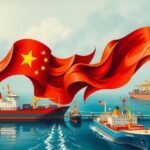Politics
ASIA, ASSAM, BANGLADESH, BHUTAN, CHINA, DHAKA, DIPLOMACY, FOREIGN POLICY, HIM, INDIA, INDIAN, INDIAN STATES, INFRASTRUCTURE PROJECTS, INTERNATIONAL RELATIONS, MEXICO, MINISTRY OF EXTERNAL AFFAIRS, MUHAMMAD YUNUS, NEPAL, NEW DELHI, NORTH AMERICA, SEVEN SISTERS, SHEIKH HASINA, SISTERS, SOUTH ASIA, SOUTHEAST ASIA, THAILAND, YUN, YUNUS
Sophia Klein
Bangladesh Chief Adviser Yunus’s Visit to China Sparks Diplomatic Tensions with India
Bangladesh Chief Adviser Muhammad Yunus’s remarks in China regarding regional connectivity and trade have drawn sharp criticism from India. His comments suggest a potential shift in Bangladesh’s foreign policy, inciting diplomatic tensions. Upcoming interactions between Indian and Bangladeshi leaders may offer a chance to mend relations.
Recently, Bangladesh Chief Adviser Muhammad Yunus made remarks during his attendance at the Boao Forum for Asia conference in China, which have elicited critical responses from India. He spoke about the need for improved connectivity and trade in the region, describing the northeastern Indian States, the “Seven Sisters,” as a “land-locked” region, and portrayed Bangladesh as the “guardian of ocean access.” He suggested that China consider these Indian States, along with Bhutan and Nepal, as an “extension of the Chinese economy.” This visit marks Mr. Yunus’s first trip to China since assuming office after the removal of former Prime Minister Sheikh Hasina last August, amid ongoing tensions with India over minority treatment in Bangladesh and issues regarding Ms. Hasina’s repatriation.
The absence of an invitation from New Delhi further accentuates the diplomatic concerns surrounding Mr. Yunus’s visit to China, sparking interpretations of a shift in Bangladesh’s foreign policy. While the Ministry of External Affairs has chosen not to comment, political figures in India, including Assam Chief Minister Himanta Biswa Sarma, have condemned Yunus’s remarks as “offensive and strongly condemnable,” implying that they seek to highlight India’s strategic weaknesses. There are calls from various regional leaders for the Indian government to express its discontent to Dhaka. Mr. Yunus was likely aware that his statements would incite controversy, reflecting a lack of sensitivity towards the perceptions of the countries he referenced, especially regarding China’s influence.
The appropriateness of the timing and venue for his statements has been questioned, with suggestions that such discussions would be more fitting at the upcoming BIMSTEC summit in Thailand, which will convene Prime Minister Modi and other regional leaders. It is noteworthy that Mr. Yunus received two letters from India recently—one from President Droupadi Murmu extending Eid-ul-Fitr greetings, and another from Prime Minister Modi in celebration of Bangladesh’s Independence Day. Although no formal meeting between Mr. Modi and Mr. Yunus is announced for Bangkok, it is anticipated that informal interactions may occur to alleviate tensions and seek a path towards more constructive relations.
In summary, Chief Adviser Muhammad Yunus’s comments during his China visit have incited significant diplomatic tension with India, raising concerns over shifts in Bangladesh’s foreign policy. His remarks regarding regional connectivity and China’s economic role were met with strong criticism from Indian political leaders. The anticipated informal engagements between Mr. Modi and Mr. Yunus at the upcoming BIMSTEC summit may provide an opportunity to address these strains and promote better bilateral relations.
Original Source: www.thehindu.com








Post Comment